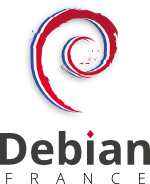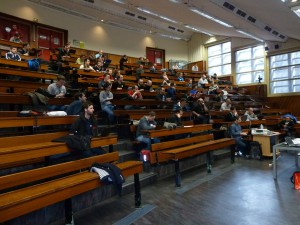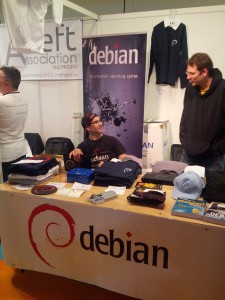
The annual Debian developer meeting took place in Portland, Oregon, 23 to 31
August 2014.
DebConf14 attendees
participated in talks, discussions, workshops and programming sessions. Video
teams captured a lot of the main talks and discussions for streaming for
interactive attendees and for the
Debian video
archive.
Between the video, presentations, and handouts the coverage came from the
attendees in blogs, posts, and project updates. We ve gathered a few articles
for your reading pleasure:
Gregor Herrmann and a few members of the Debian Perl group had an informal
unofficial
pkg-perl micro-sprint and were very productive.
Vincent Sanders
shared
an inspired gift in the form of a plaque given to Russ Allbery in thanks
for his tireless work of keeping sanity in the Debian mailing lists. Pictures
of the plaque and design scheme are linked in the post. Vincent also
shared
his experiences of the conference and hopes the organisers have recovered.
Noah Meyerhans adventuring to
Debian by
train, (Inter)netted some interesting IPv6 data for future road and
railwarriors.
Hideki Yamane sent a
gentle
reminder for English speakers to speak more slowly.
Daniel Pocock posted of
GSoC talks at
DebConf14, highlights include the Java Project Dependency Builder and the
WebRTC JSCommunicator.
Thomas Goirand gives us some insight into a working task list of
accomplishments and projects
he was able to complete at DebConf14, from the OpenStack discussion to tasksel
talks, and completion of some things started last year at DebConf13.
Antonio Terceiro
blogged
about debci and the Debian Continuous Integration project, Ruby, Redmine, and
Noosfero. His post also shares the atmosphere of being able to interact
directly with peers once a year.
Stefano Zacchiroli
blogged
about a
talk
he did on
debsources which now has
its own
HACKING
file.
Juliana Louback penned:
DebConf
2014 and How I Became a Debian Contributor.
Elizabeth Krumbach Joseph s
in-depth summary of
DebConf14 is a great read. She discussed Debian Validation & CI, debci
and the Continuous Integration project, Automated Validation in Debian using
LAVA, and Outsourcing webapp maintenance.
Lucas Nussbaum by way of a
blog post releases the
very first version of Debian Trivia modelled after the TCP/IP Drinking Game.
Fran ois Marier s shares additional information and further discussion on
Outsourcing
your webapp maintenance to Debian.
Joachim
Breitner gave a
talk
on Haskell and Debian, created a new tool for binNMUs for Haskell packages
which runs via cron job. The output is available for
Haskell and
for
OCaml,
and he still had a small amount of time to go dancing.
Jaldhar Harshad Vyas was not able to attend DebConf this year, but he did tune
in to the videos made available by the video team and gives an
insightful
viewpoint to what was being seen.
J r my Bobbio
posted
about Reproducible builds in Debian in his recap of DebConf14. One of the
topics at hand involved defining a canonical path where packages must be built
and a BOF discussion on reproducible builds from where the conversation moved
to discussions in both
Octave and
Groff.
New helpers
dh_fixmtimes
and
dh_genbuildinfo
were added to BTS. The
.buildinfo
format has been specified on the wiki and reviewed. Lots of work is being done
in the project, interested parties can help with the
TODO
list or join the new IRC channel #debian-reproducible on irc.debian.org.
Steve McIntyre posted a
Summary from
the d-i / debian-cd BoF at DC14, with some of the
session
video available online. Current jessie D-I needs some help with the
testing on less common architectures and languages, and release scheduling
could be improved. Future plans: Switching to a GUI by default for jessie,
a default desktop and desktop choice, artwork, bug fixes and new architecture
support. debian-cd: Things are working well. Improvement discussions are on
selecting which images to make I.E. netinst, DVD, et al., debian-cd in
progress with http download support, Regular live test builds, Other
discussions and questions revolve around which ARM platforms to support,
specially-designed images, multi-arch CDs, and cloud-init based images. There
is also a call for help as the team needs help with testing, bug-handling, and
translations.
Holger Levsen reports on
feedback
about the feedback from his LTS
talk
at DebConf14. LTS has been perceived well, fits a demand, and people are
expecting it to continue; however, this is not without a few issues as Holger
explains in greater detail the lacking gatekeeper mechanisms, and how
contributions are needed from
finance to
uploads. In other news the
security-tracker
is now fixed to know about old stable. Time is short for that fix as once
jessie is released the tracker will need to support stable, oldstable which
will be wheezy, and oldoldstable.
Jonathan McDowell s
summary
of DebConf14 includes a fair perspective of the host city and the benefits of
planning of a good DebConf14 location. He also talks about the need for
facetime in the Debian project as it correlates with and improves everyone s
ability to work together. DebConf14 also provided the chance to set up a hard
time frame for
removing
older 1024 bit keys from Debian keyrings.
Steve McIntyre posted a
Summary from
the State of the ARM BoF at DebConf14 with updates on the 3 current
ports armel, armhf and arm64. armel which targets the ARM EABI soft-float
ARMv4t processor may eventually be going away, while armhf which targets the
ARM EABI hard-float ARMv7 is doing well as the cross-distro standard. Debian
is has moved to a single armmp kernel flavour using Device Tree Blobs and
should be able to run on a large range of ARMv7 hardware. The arm64 port
recently entered the main archive and it is hoped to release with jessie with
2 official builds hosted at ARM. There is talk of laptop development with an
arm64 CPU. Buildds and hardware are mentioned with acknowledgements for
donated new machines, Banana Pi boards, and software by way of ARM s
DS-5 Development Studio - free for all Debian
Developers. Help is needed! Join #debian-arm on irc.debian.org and/or the
debian-arm mailing list.
There is an upcoming
Mini-DebConf in
November 2014 hosted by ARM in Cambridge, UK.
Tianon Gravi
posted
about the atmosphere and contrast between an average conference and a DebConf.
Joseph Bisch posted about meeting his GSOC mentors, attending and contributing
to a keysigning event and did some work on debmetrics which is powering
metrics.debian.net. Debmetrics provides
a uniform interface for adding, updating, and viewing various metrics
concerning Debian.
Harlan Lieberman-Berg s
DebConf Retrospective
shared the feel of DebConf, and detailed some of the work on debugging a build
failure, work with the pkg-perl team on a few uploads, and work on
a javascript slowdown issue on codeeditor.
Ana Guerrero L pez reflected on
Ten
years contributing to Debian.
 I recently spent some time updating my systemd knowledge and decided to put together some slides that I ll use for a lecture. I m interested in feedback about things that are missing, unclear, etc. Available on slideshare, as PDF, and as LaTeX source.
I recently spent some time updating my systemd knowledge and decided to put together some slides that I ll use for a lecture. I m interested in feedback about things that are missing, unclear, etc. Available on slideshare, as PDF, and as LaTeX source.
 Some of you may already be aware of the
Some of you may already be aware of the
 The annual Debian developer meeting took place in Portland, Oregon, 23 to 31
August 2014.
The annual Debian developer meeting took place in Portland, Oregon, 23 to 31
August 2014. 
 If you follow my blog closely, you noticed that I skipped all my usual monthly summaries in 2014. It s not that I stopped doing free software work, instead I was just too busy to be able to report about what I did. As an excuse, let me tell you that we just moved into a new house which was in construction since may last year.
The lack of visible activity on my blog resulted in a steady decrease of the amount of
If you follow my blog closely, you noticed that I skipped all my usual monthly summaries in 2014. It s not that I stopped doing free software work, instead I was just too busy to be able to report about what I did. As an excuse, let me tell you that we just moved into a new house which was in construction since may last year.
The lack of visible activity on my blog resulted in a steady decrease of the amount of  I also helped Sylvestre Ledru to finalize and close the
I also helped Sylvestre Ledru to finalize and close the 

 In accordance with its constitution, the Debian Project has just elected
Javier Merino Cacho as Debian Project Leader. More than 80% of voters put
him as their first choice (or equal first) on their ballot papers.
Javier's large majority over his opponents shows how his inspiring vision for
the future of the Debian project is largely shared by the other developers.
In accordance with its constitution, the Debian Project has just elected
Javier Merino Cacho as Debian Project Leader. More than 80% of voters put
him as their first choice (or equal first) on their ballot papers.
Javier's large majority over his opponents shows how his inspiring vision for
the future of the Debian project is largely shared by the other developers.
